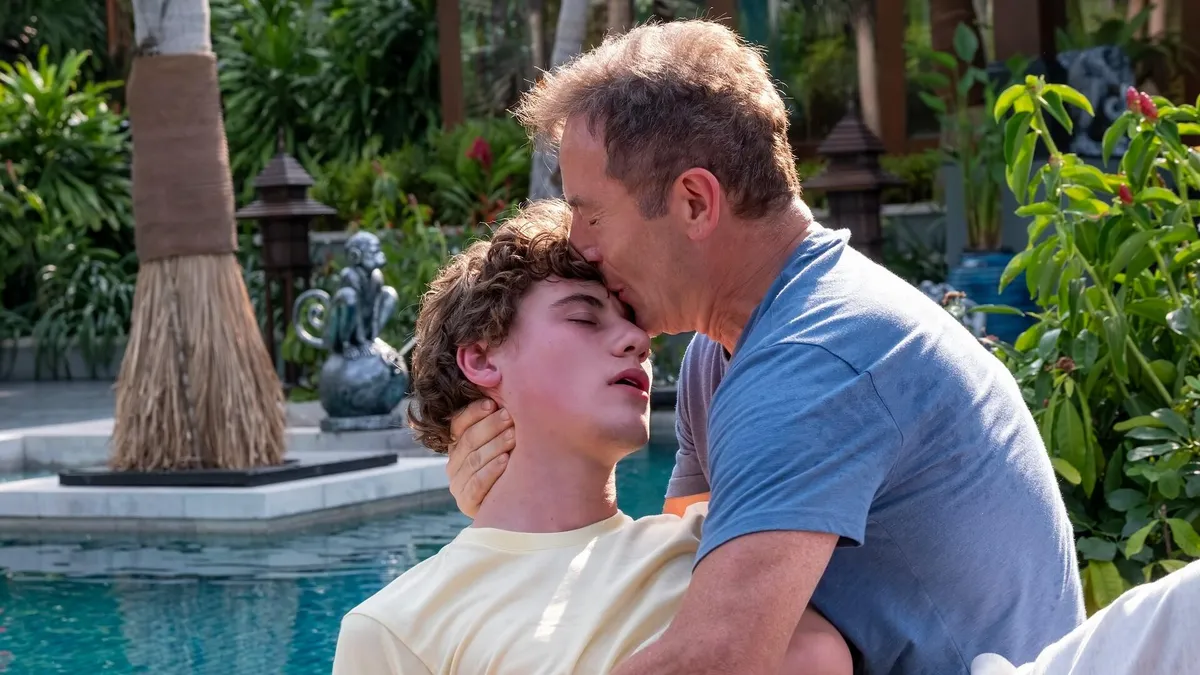The Season 3 finale of The White Lotus opens by resolving the long-standing mystery introduced in Episode 1: the gunshots and the floating body. It’s Rick’s impulsive confrontation with Jim that sets off a chain of chaos. After failing to kill Jim earlier due to a moment of misplaced sympathy, Rick ends up killing him later, only to find out from Sritala that Jim was his biological father.
This horrifying revelation fuels Rick’s spiral, which tragically ends with Chelsea being accidentally shot in the ensuing gunfight. Her death becomes a sobering moment of loss in an already volatile finale.
In a surprising twist, Gaitok, the seemingly sweet and mild-mannered resort employee, becomes the one to take Rick down, earning respect and a promotion from Sritala. By killing Rick, Gaitok wins Mook’s admiration and secures a better future, all while keeping quiet about Valentin’s crimes, including his involvement in the resort jewelry heist.
His silence marks a calculated decision, choosing personal advancement over justice. In this way, Gaitok’s arc reflects how loyalty and violence can be currency in a world where power dynamics rule.
Poison, Visions, and a Family Unraveling Under the Weight of Delusion and Despair
Lochlan’s storyline provides one of the finale’s more surreal and symbolic moments. After unknowingly consuming remnants of the poisonous pong-pong seed from his father’s earlier murder plot, he seemingly dies but experiences a vivid vision involving monks and his siblings. Miraculously, he comes back to life.

His survival hints at themes of rebirth and spiritual awakening, though the show leaves it ambiguous whether his vision was divine or a hallucination. Either way, Lochlan’s experience stands out as one of the most mystically charged moments of the finale.
Timothy’s plan to murder his entire family (minus Lochlan) using poisoned piña coladas shows just how far gone he’s become in the wake of his financial crimes. Believing that death would spare them the shame of poverty, he lets them begin drinking the cocktails before pulling back at the last moment.
He stops Saxon just in time, unable to fully commit to the atrocity. The moment is a chilling reminder of how delusion and desperation can twist someone’s sense of morality, especially when they believe they’re doing something “for love.”
Privilege, Honesty, and Unexpected Wins Reshape the Final Moments at the Thai Resort
Piper’s arc ends with comedic yet revealing commentary on her sheltered personality. After a stint at a Buddhist monastery, she decides not to stay in Thailand—not because of any deep spiritual reckoning, but because she didn’t like the food. This superficial reason highlights her immaturity and reinforces that she’s not as enlightened as she’d hoped. Piper’s last-minute retreat back into comfort aligns her with the rest of the Ratliffs, whose privilege and detachment from reality remain unshaken.
In contrast to the high drama elsewhere, Laurie, Jaclyn, and Kate’s subplot finds a quiet emotional resolution. Laurie’s candid confession about her sadness and feelings of inadequacy during the trip fosters a rare moment of honesty among the trio. Her vulnerability softens the usually glamorous and snarky dynamic, bringing them closer together. It’s one of the few genuinely heartfelt developments in a finale packed with betrayal, violence, and deceit.
Belinda and Zion land a major victory by renegotiating Greg’s hush money deal to a staggering $5 million, effectively exposing his lingering guilt over Tanya’s fate from Season 2. Even with the windfall, Belinda quietly leaves the resort without informing her local contact, Pornchai—an action that echoes how Tanya once left her behind emotionally and professionally.
As the finale wraps up, the closing montage paints a bittersweet picture: some characters emerge wealthier or more enlightened, while others face devastating consequences. Rick’s unraveling, Chelsea’s untimely death, and Gaitok’s unlikely rise all highlight how chaos, karma, and power collide throughout The White Lotus saga.



